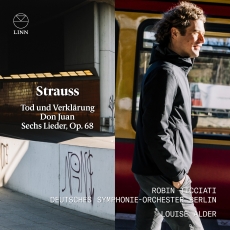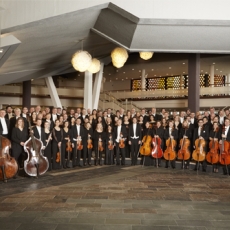Robin Ticciati, DSO Berlin & Louise Alder - Strauss - MusicWeb International [SC]
The Deutsches Symphonie-Orchester Berlin (DSO-Berlin) led by Robin Ticciati continues to thrive. They do their exceptional work in the recording studio with their fifth disc, an all-Strauss programme. London-born Ticciati first guest-conducted the Berlin orchestra in 2014, and has been its music director from the 2017/2018 season. His contract has been renewed for another five years, until 2027.
Three of their albums, all released by Linn, stand out: French repertoire that comprises works by Debussy, Duparc, Ravel, Duruflé and Fauré, featuring mezzo-soprano Magdalena Kožená. Another album, Bruckner’s Sixth Symphony, was also released by Linn. The partnership has released another highly praised disc on Ondine: a coupling of the Beethoven and Sibelius Violin Concertos with soloist Christian Tetzlaff.
Certainly no stranger to Strauss’s music, in 2014 Ticciati commenced his appointment as music director at Glyndebourne by conducting Der Rosenkavalier in Richard Jones’s new staging. My appetite has certainly been whetted for this Ticciati/DSO-Berlin partnership’s new release. It comprises the tone poems Tod und Verklärung and Don Juan, and the orchestral song collection Sechs Lieder - Brentano Lieder. For Brentano Lieder Ticciati teams up with soprano Louise Alder. They have worked together previously, conspicuously in 2018 on that Der Rosenkavalier at Glyndebourne.
Strauss’s tone poem for large orchestra, Don Juan, has maintained an enduring fame, and is undoubtedly one of his most frequently played orchestral works. Don Juan is a fictional character based on traditional folklore of the Spanish Golden Age of arts and literature. A renowned Spanish philanderer Don Juan is the principal character in a number of plays, in particular by Molière, Dumas and Shaw, a poem by Byron, and Mozart’s Don Giovanni, an opera which Strauss often conducted. Strauss was only twenty-four when he commenced sketches for his tone poem based on the Don Juan legend. He claimed that his inspiration came from Nikolaus Lenau’s version, an unfinished fragment of German verse, published posthumously in 1851. Don Juan was regarded as a revolutionary work when introduced in Weimar in 1889; its success elevated Strauss to star status. It is easy to imagine this was an extremely happy period in his life. Around that time he had met and fallen in love with Pauline de Ahna, whom he married in 1894.
Right from the heroic introduction to the concluding measures when the music fades away, solemnly suggestive of the protagonist’s final breaths following a duel, Ticciati and his players give a consistently alert performance. It ranges from winsome tenderness to light-hearted comedy to heroic grandeur. Narrowly lighter in weight than many rival recordings, this interpretation communicates plenty of vitality, numerous exhilarating episodes and thrilling climaxes, with no shortage of intensity. Unfettered, the music pours forward splendidly, producing a wealth of colour in this incident-packed score.
Early in his composing career, Strauss wrote a considerable quantity of Lieder. Clearly the Bavarian composer was enamoured by the soprano voice; his wife was a noted soprano too. In 1905 came his triumph: Salome. The opera provoked outrage but propelled Strauss to international fame. From 1907 there was a gap of twelve or so years whilst he concentrated on his operas: Elektra, Der Rosenkavalier, Ariadne auf Naxos; after completing both Die Frau ohne Schatten and the tone poem Eine Alpensinfonie, he returned to writing Lieder. He adored the soprano voice but he made no compromises when it came to the level of challenge demanded of his settings. In 1918 he wrote his Sechs Lieder settings for soprano and piano of six Romantic poems by German Romantic poet Clemens Brentano, a collection widely known as Brentano Lieder. Strauss himself orchestrated the Brentano Lieder, No. 6 Lied der Frauen (Song of the Women) in 1933, and the remaining five in 1940.
Soloist in the Brentano Lieder is soprano Louise Alder. She first came to my attention as winner of the audience Prize at the 2017 Cardiff Singer of the World Competition. A graduate of the Royal College of Music, London in 2014, Alder was spotted during concert performance by the Intendant of Frankfurt Oper. After audition, she was invited to join the ensemble with the opportunity to sing a number of roles. London-born Alder is no stranger to the music of Strauss. Her breakthrough role was as a short-notice replacement as Sophie in Der Rosenkavalier with Glyndebourne Festival Opera under Ticciati at a 2014 BBC Proms concert. Alder’s passion for Strauss Lieder is further evidenced by the content of her debut, solo recital album ‘Through Life and Love’ (2017), a programme of Strauss Lieder on Orchid.
This is widely considered to be difficult repertoire. Alder acknowledges this in the notes, describing the Brentano Lieder as ‘a fiendish but beloved cycle of Strauss songs’. Alder is a lyric soprano with a bright tone but certainly not of the ear-piercing type and is in captivating form here. There is plenty to relish in her fresh and attractive voice, refined and with a pearly smoothness and impeccable intonation, producing a glistening colour palette. She displays a disarming level of sincerity to express the import and mood of the text.
My highlights include Sausle, liebe Myrte (Rustle, dear Myrtle), a fine demonstration of how comfortable Alder is in her high register, without losing her bright, attractive tone. An example of her fluidity and ability to hold her high notes superbly well is Als mir dein Lied erklang (As your song rang out), remarkably well sung. Here, Alder persuasively reveals her affinity for Brentano’s text on nature and love. I also like Amor (Cupid), with Alder in captivating voice. Towards the conclusion she displays her highly effective and unforced coloratura. Standing out is the last and longest of the cycle, Lied der Frauen (Song of the Women). In each of the six stanzas Adler successfully communicates the sections of stormy angst with plenty of commitment, and gives a successful contrast with passages of lessening power and tension. Although evident, Adler’s vibrato never intrudes and rather suits this collection.
Strauss wrote his tone poem Tod und Verklärung (Death and Transfiguration) in 1888-1889 in an attempt to depict the last moments of an artist on his deathbed, reflecting on his youth. Here Strauss was unable to draw upon his own personal experience of serious illness and was using his imagination. At Strauss’ behest, his friend Alexander Ritter wrote an explanatory narrative poem of Tod und Verklärung, in effect a programme note which Strauss later appended to the score.
The bar is set high for the performance of the whole work with the glorious playing of the opening section. Ticciati and the DSO-Berlin ensure the writing has a dreamlike tenderness and prominent woodwind that sound flawless. Then by stark contrast at point 4:59 the music bursts into life dramatically. There is impressive freshness and positive approach of the performance, the forward momentum is striking as is the vivid palette of orchestral colour produced. Ticciati and his Berlin players provide a quite splendid performance of Tod und Verklärung.
The recording at Jesus-Christus-Kirche, Berlin was made in studio conditions. At this acclaimed recording venue, the engineering team for Linn have achieved pleasing sound, especially well balanced. In the booklet, there is Joseph E. Jones’s helpful essay. I am grateful to Linn for the sung German texts together with English translations. There is room on the disc to have accommodated two or three additional Strauss Lieder but, as he wrote over two hundred, the choice is surely bewildering.
On this all-Strauss album, the DSO-Berlin under Robin Ticciati play beautifully throughout, with a strong sense of engagement. Although rewarding, these performances of the two tone poems do not quite attain the level of passion and grandeur present in my recommendations – see below. Soprano Louise Alder is worthy of attention for a most praiseworthy performance of the Brentano Lieder.



